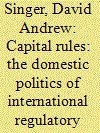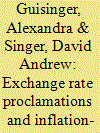| Srl | Item |
| 1 |
ID:
057733


|
|
|
| 2 |
ID:
095026


|
|
|
|
|
| Publication |
2010.
|
| Summary/Abstract |
If governments choose economic policies that often run counter to their public commitments, are those commitments meaningless? We argue that government proclamations can be critical in signaling economic policy intentions. We focus on the realm of exchange rate policy, in which countries frequently implement an exchange rate regime that differs from the officially declared regime. We argue that the official exchange rate regime is one of the most important signals of a government's economic policy preferences. When a government makes a de jure public commitment to a fixed exchange rate, it sends a signal to domestic and international markets of its strict monetary-policy priorities. In contrast, a government that proclaims a floating exchange rate signals a desire to retain discretion over monetary policy, even if it has implemented a de facto fixed rate. We use data on 110 developed and developing countries from 1974 to 2004 to test two hypotheses: first, that governments that adopt de facto fixed exchange rates will experience less inflation when they back up their actions with official declarations; and second, that governments that abide by their commitments-as demonstrated by a history of following through on their public declarations of a fixed exchange rate regime-will establish greater inflation-fighting credibility. Within developing countries, democratic institutions enhance this credibility. Results from fixed-effects econometric models provide strong support for our hypotheses.
|
|
|
|
|
|
|
|
|
|
|
|
|
|
|
|
| 3 |
ID:
082470


|
|
|
|
|
| Publication |
2008.
|
| Summary/Abstract |
Are equity markets just another facet of global finance, or are they unique in their responses to-and influences on-government policies and institutions? Recent work has explored the impact of political factors on bond market behavior and foreign direct investment, but little attention has been paid to stock markets. On the basis of the particular concerns of equity investors, we hypothesize a positive association between stock-market valuations and levels of democracy, shareholder rights, legal traditions, and capital-account liberalization, a negative association with real interest rates, and no association with fiscal deficits or surpluses. We assess our expectations by analyzing the political and institutional determinants of aggregate price-to-earnings ratios for a sample of up to 37 countries from 1985 to 2004, using both cross-sectional and time-series cross-sectional analyses. We find support for most, but not all, of our hypotheses. Our findings suggest that we must disaggregate the effects of different asset markets to understand the impact of economic globalization on government policies
|
|
|
|
|
|
|
|
|
|
|
|
|
|
|
|